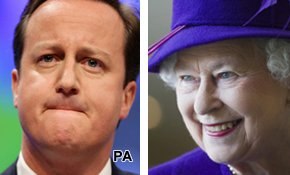66% want Elizabeth II to remain Monarch; The Queen voted more popular than Politicians
While enthusiasm for the royals is expected to dwindle in the aftermath of the Jubilee weekend, support for Queen Elizabeth II stays strong with our poll revealing that two thirds of the British public think the Queen should remain monarch for as long as she lives. Meanwhile, almost half feel support for keeping the monarchy is the highest it has been.
- 66% think the Queen should remain monarch for as long as she lives while 23% think she should retire and step down from the throne
- 47% think support for keeping the monarchy over having an elected President is higher than it has been in the past while 11% think it is lower
- 56% think the Diamond Jubilee is a high point for the monarchy while 14% think the Diamond Jubilee is not a particular high point at all
In an address to the Houses of Parliament earlier this year, the Queen “rededicated” herself to the service of her country for the rest of her life. Prime Minister David Cameron has said the concept of the Queen abdicating and passing on the crown was “out of the question”.
The Queen more popular than politicians
A higher volume of Britons seem to feel that when it comes to governing, the Queen is more concerned about “problems facing ordinary Britons” than senior politicians and government ministers, as well as being seen as more “in touch with what ordinary Britons think and feel.”
- 35% think the Queen is more concerned about problems facing ordinary Britons, while only 9% say politicians and government ministers are the more concerned ones
- 31% feel neither the Queen nor senior politicians and government ministers are concerned about problems facing ordinary Britons
- 17% think both are equally concerned about problems facing ordinary Britons
- 28% think the Queen is more in touch with ordinary Britons think while 9% say politicians
- 10% feel both the queen and politicians are equally in touch with what ordinary Britons think and feel, while 45% think neither of them are in touch with ordinary Britons
As the Queen’s ability to apparently understand the everyday difficulties of the British people overshadows politicians and depicts them as out of touch, David Cameron is quick to join the praise of the monarch, lauding her for her “100 per cent dedication” to the people of Britain.
Cameron went on to commend the Queen’s ability to “cut through the fluff and nonsense” of day to day politics and described her as “an extraordinarily devoted public servant.”
Popularity ‘no great feat’?
Some have argued that the Queen’s popularity compared to elected officials is often overhyped, as beating politicians in a popularity race is no great feat in the grand scheme of things. Peter Wilby writes in the Guardian that as the Queen “never has to say anything controversial, allocate resources between competing claims, or make decisions that provoke disagreement” it is unsurprising that she would remain more popular in the public eye. Though Wilby explains that he feels Elizabeth II “deserves congratulations” for fulfilling her duties, he maintains: “If your job is confined to uttering bland pleasantries, shaking hands and distributing gongs, it is quite difficult to be unpopular.”
Others remain more vehemently against the monarchy, naming them the “privileged exploiters” by groups such as the Communist Party of Great Britain. In an article which features in their newsletter the Proletarian, the Party discusses how anti-royalists are mostly made up those Britons who experience “the brunt of the economic crisis” and are struck by a “simmering resentment” towards the royals and their lifestyle.
“The Queen is not ‘ours’, but theirs. She is of and for that tiny handful of ruthless exploiters who keep the world’s people in poverty and servitude, and we must not be fooled by sentimental hogwash into imagining that she has any interest in seeing our children taken care of.”








